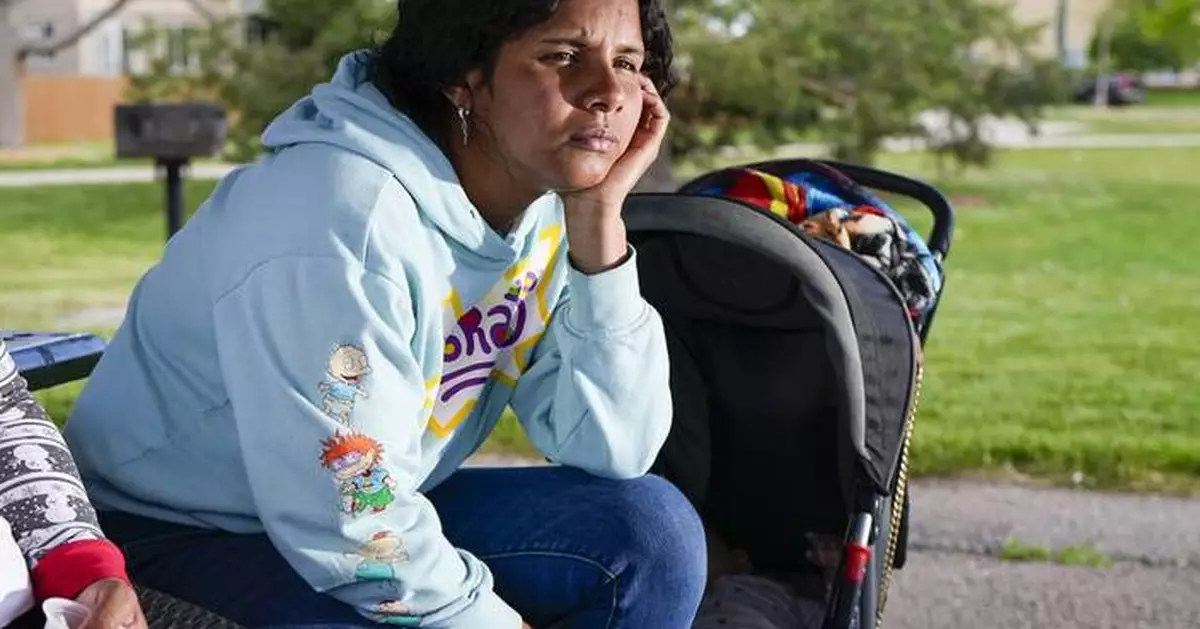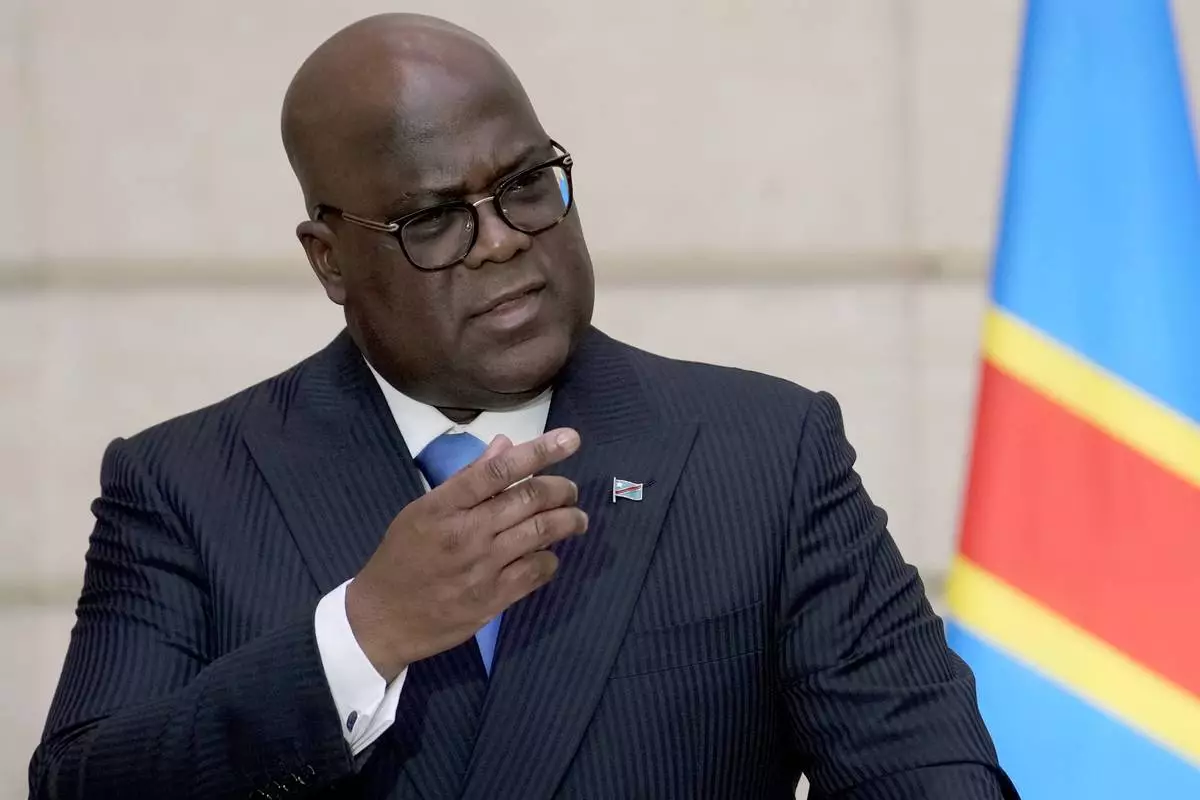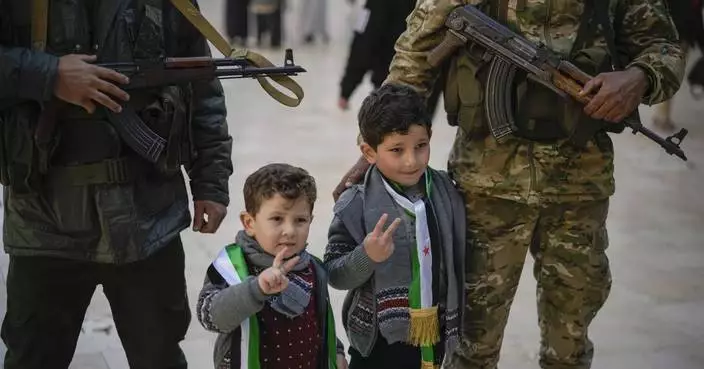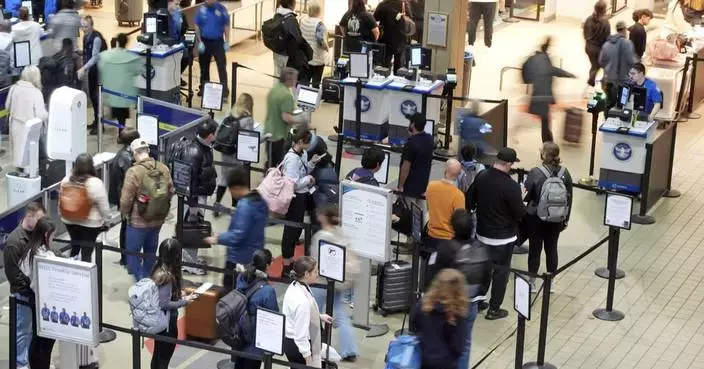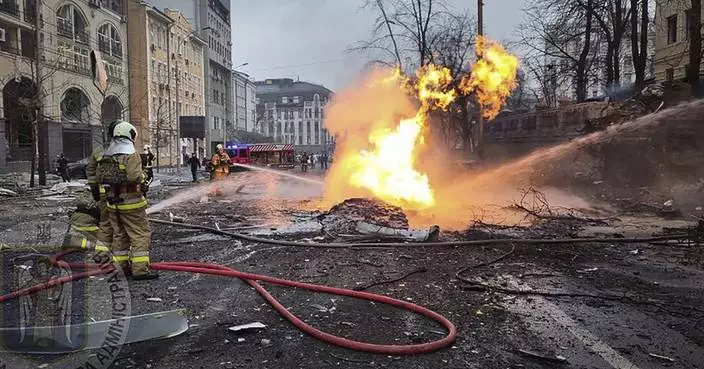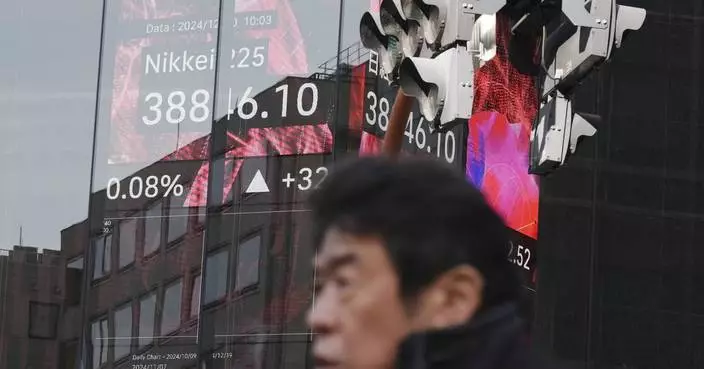AURORA, Colo. (AP) — She was eight months pregnant when she was forced to leave her Denver homeless shelter. It was November.
Ivanni Herrera took her 4-year-old son Dylan by the hand and led him into the chilly night, dragging a suitcase containing donated clothes and blankets she’d taken from the Microtel Inn & Suites. It was one of 10 hotels where Denver has housed more than 30,000 migrants, many of them Venezuelan, over the last two years.
First they walked to Walmart. There, with money she and her husband had collected from begging on the street, they bought a tent.
They waited until dark to construct their new home. They chose a grassy median along a busy thoroughfare in Aurora, the next town over, a suburb known for its immigrant population.
“We wanted to go somewhere where there were people,” Herrera, 28, said in Spanish. “It feels safer.”
That night, temperatures dipped to 32 degrees. And as she wrapped her body around her son's to keep him warm enough that he could sleep, Ivanni Herrera cried.
Over the past two years, a record number of families from Venezuela have come to the United States seeking a better life for themselves and their children. Instead, they’ve found themselves in communities roiling with conflict about how much to help the newcomers — or whether to help at all.
Unable to legally work without filing expensive and complicated paperwork, some are homeless and gambling on the kindness of strangers to survive. Some have found themselves sleeping on the streets — even those who are pregnant.
Like many in her generation, regardless of nationality, Herrera found inspiration for her life’s ambitions on social media. Back in Ecuador, where she had fled years earlier to escape the economic collapse in her native Venezuela, Herrera and her husband were emboldened by images of families like theirs hiking across the infamous Darién Gap from Colombia into Panama. If all those people could do it, they thought, so can we.
They didn’t know many people who had moved to the United States, but pictures and videos of Venezuelans on Facebook and TikTok showed young, smiling families in nice clothes standing in front of new cars boasting of beautiful new lives. U.S. Border Patrol reports show Herrera and the people who inspired her were part of an unprecedented mass migration of Venezuelans to America. Some 320,000 Venezuelans have tried to cross the southern border since October 2022 — more than in the previous nine years combined.
Just weeks after arriving in Denver, Herrera began to wonder if the success she had seen was real. She and her friends had developed another theory: The hype around the U.S. was part of some red de engaño, or network of deception.
After several days of camping on the street and relieving herself outside, Herrera began to itch uncontrollably with an infection. She worried: Would it imperil her baby?
She was seeing doctors and social workers at a Denver hospital where she planned to give birth because they served everyone, even those without insurance. They were alarmed their pregnant patient was now sleeping outside in the cold.
Days after she was forced to leave the Microtel, Denver paused its policy and allowed homeless immigrants to stay in its shelters through the winter. Denver officials say they visited encampments to urge homeless migrants to come back inside. But they didn’t venture outside the city limits to Aurora.
As Colorado's third-largest city, Aurora, on Denver’s eastern edge, is a place where officials have turned down requests to help migrants. In February, the Aurora City Council passed a resolution telling other cities and nonprofits not to bring migrants into the community because it “does not currently have the financial capacity to fund new services related to this crisis.” Yet still they come, because of its lower cost of living and Spanish-speaking community.
In fact, former President Donald Trump last week called attention to the city, suggesting a Venezuelan gang had taken over an apartment complex. Authorities say that hasn’t happened.
The doctors treated Herrera’s yeast infection and urged her to sleep at the hospital. It wouldn’t cost anything, they assured her, just as her birth would be covered by emergency Medicaid, a program that extends the health care benefits for poor American families to unauthorized immigrants for labor and delivery.
Herrera refused.
“How," she asked, "could I sleep in a warm place when my son is cold on the street?”
It was March when David Jaimez, his pregnant wife and their two daughters were evicted from their Aurora apartment. Desperate for help, they dragged their possessions into Thursday evening Bible study at Jesus on Colfax, a church and food pantry inside an old motel. Its namesake and location, Colfax Avenue, has long been a destination for the drug-addicted, homeless veterans and new immigrants.
When the Jaimez family arrived, the prayers paused. The manager addressed the family in elementary Spanish, supplementing with Google Translate on her phone.
After arriving from Venezuela in August and staying in a Denver-sponsored hotel room, they'd moved into an apartment in Aurora. Housing is cheaper in that eastern suburb, but they never found enough work to pay their rent. “I owe $8,000,” Jaimez said, his eyes wide. “Supposedly there’s work here. I don’t believe it.”
Jaimez and his wife are eligible to apply for asylum or for “ Temporary Protected Status ” and, with that, work permits. But doing so would require an attorney or advisor, months of waiting and $500 in fees each.
At the prayer group, Jaimez's daughters drank sodas and ate tangerines from one participant, a middle-aged woman and Aurora native. She stroked the ponytail of the family’s 8-year-old daughter as the young girl smiled.
When the leader couldn’t find anywhere for the family to stay, they headed out into the evening, pushing their year-old daughter in her stroller and lugging a suitcase behind them. After they left, the middle-aged woman leaned forward in her folding chair and said: “It’s kind of crazy that our city lets them in but does not help our veterans." Nearby, a man nodded in agreement.
That night, Jaimez and his family found an encampment for migrants run by a Denver nonprofit called All Souls and moved into tent number 28. Volunteers and staff brought in water, meals and other resources. Weeks later, the family was on the move again: Camping without a permit is illegal in Denver, and the city closed down the encampment. All Souls re-established it in six different locations but closed it permanently in May.
At its peak, nearly 100 people were living in the encampment. About half had been evicted from apartments hastily arranged before their shelter time expired, said founder Candice Marley. Twenty-two residents were children and five women were pregnant, including Jaimez’s wife. Marley is trying to get a permit for another encampment, but the permit would only allow people over 18.
“Even though there are lots of kids living on the street, they don’t want them all together in a camp,” Marley said. "That’s not a good public image for them.”
Denver officials say they won’t tolerate children sleeping on the street. “Did you really walk from Venezuela to be homeless in the U.S.? I don’t think so,” said Jon Ewing, spokesman for Denver’s health and human services department. “We can do better than that.”
Still, Denver struggled to keep up with the rush of migrants, many arriving on buses chartered by Texas to draw attention to the impact of immigration. All told, Denver officials say they have helped some 42,700 migrants since last year, either by giving them shelter or a bus fare to another city.
Initially, the city offered migrants with families six weeks in a hotel. But in May, on pace to spend $180 million this year helping newcomers, the city scaled back its offer to future migrants while deepening its investment in people already getting help.
Denver paid for longer shelter stays for 800 migrants already in hotels and offered them English classes and help applying for asylum and work permits. But any migrants arriving since May have received only three days in a hotel. After that, some have found transportation to other cities, scrounged for a place to sleep or wandered into nearby towns like Aurora.
Today, fewer migrants are coming to the Denver area, but Marley still receives dozens of outreaches per week from social service agencies looking to help homeless migrants. “It’s so frustrating that we can’t help them,” she said. “That leaves families camping on their own, unsupported, living in their cars. Kids can’t get into school. There’s no stability.”
After the encampment closed, Jaimez and his family moved into a hotel. He paid by holding a cardboard sign at an intersection and begging for money. Their daughter only attended school for one month last year, since they never felt confident that they were settled anywhere more than a few weeks. The family recently moved to a farm outside of the Denver area, where they've been told they can live in exchange for working.
When Herrera started feeling labor pains in early December, she was sitting on the grass, resting after a long day asking strangers for money. She waited until she couldn’t bear the pain anymore and could feel the baby getting close. She called an ambulance.
The paramedics didn’t speak Spanish but called an interpreter. They told Herrera they had to take her to the closest hospital, instead of the one in Denver, since her contractions were so close together.
Her son was born healthy at 7 pounds, 8 ounces. She brought him to the tent the next day. A few days later the whole family, including the baby, had contracted chicken pox. “The baby was in a bad state,” said Emily Rodriguez, a close friend living with her family in a tent next to Herrera’s.
Herrera took him to the hospital, then returned to the tent before being offered a way out. An Aurora woman originally from Mexico invited the family to live with her — at first, for free. After a couple weeks, the family moved to a small room in the garage for $800 a month.
To earn rent and pay expenses, Herrera and Rodriguez have cleaned homes, painted houses and shoveled snow while their children waited in a car by themselves. Finding regular work and actually getting paid for it has been difficult. While their husbands can get semi-regular work in construction, the women’s most consistent income comes from something else: standing outside with their children and begging.
Herrera and her husband recently became eligible to apply for work permits and legal residency for Venezuelans who arrived in the United States last year. But it will cost $800 each for a lawyer to file the paperwork, along with hundreds of dollars in government fees. They don't have the money.
One spring weekday, Herrera and Rodriguez stand by the shopping carts at the entrance to a Mexican grocery store. While their sons crawl along a chain of red shopping carts stacked together and baby Milan sleeps in his stroller, they try to make eye contact with shoppers.
Some ignore them. Others stuff bills in their hands. On a good day, each earns about $50.
It comes easier for Rodriguez, who’s naturally boisterous. “One day a man came up and gave me this iPhone. It’s new,” she says, waving the device in the air.
“Check out this body,” she says as she spins around, laughing and showing off her ample bottom. “I think he likes me.”
Herrera grimaces. She won't flirt like her friend does. She picks up Milan and notices his diaper is soaked, then returns him to the stroller. She has run out of diapers.
Milan was sick, but Herrera has been afraid to take him to the doctor. Despite what the hospital had said when she was pregnant, she was never signed up for emergency Medicaid. She says she owes $18,000 for the ambulance ride and delivery of her baby. Now, she avoids going to the doctor or taking her children because she’s afraid her large debt will jeopardize her chances of staying in the U.S. “I’m afraid they’re going to deport me,” she says.
But some days, when she’s feeling overwhelmed, she wants to be deported — as long as she can take her children along. Like the day in May when the security guard at the Mexican grocery store chased off the women and told them they couldn’t beg there anymore. “He insulted us and called us awful names,” Rodriguez says.
The two women now hold cardboard signs along a busy street in Denver and then knock on the doors of private homes, never returning to the same address. They type up their request for clothes, food or money on their phones and translate it to English using Google. They hand their phones to whoever answers the door.
In the garage where Herrera and her family live, the walls are lined with stuffed animals people have given her and her son. Baby Milan, on the floor, pushes himself up to look around. Dylan sleeps in bed.
Herrera recently sent $500 to her sister to make the months-long trip from Venezuela to Aurora with Herrera’s 8-year-old daughter. “I’ll have my family back together,” she says. And she believes her sister will be able to watch her kids so Herrera can look for work.
“I don’t feel equipped to handle all of this on my own,” she says.
The problem is, Herrera hasn’t told her family back in Venezuela how she spends her time. “They think I’m fixing up homes and selling chocolate and flowers,” she says. “I’m living a lie.”
When her daughter calls in the middle of the day, she’s sure not to answer and only picks up after 6 p.m. “They think I’m doing so well, they expect me to send money,” she says. And Herrera has complied, sending $100 a week to help her sister pay rent and buy food for her daughter.
Finally, her sister and daughter are waiting across the border in Mexico. When we come to the U.S., her sister asks, could we fly to Denver? The tickets are $600.
She has to come clean. She doesn't have the money. She lives day to day. The American Dream hasn't happened for Ivanni Herrera — at least, not yet. Life is far more difficult than she has let on.
She texts back:
No.
The Associated Press’ education coverage receives financial support from multiple private foundations. AP is solely responsible for all content. Find AP’s standards for working with philanthropies, a list of supporters and funded coverage areas at AP.org.
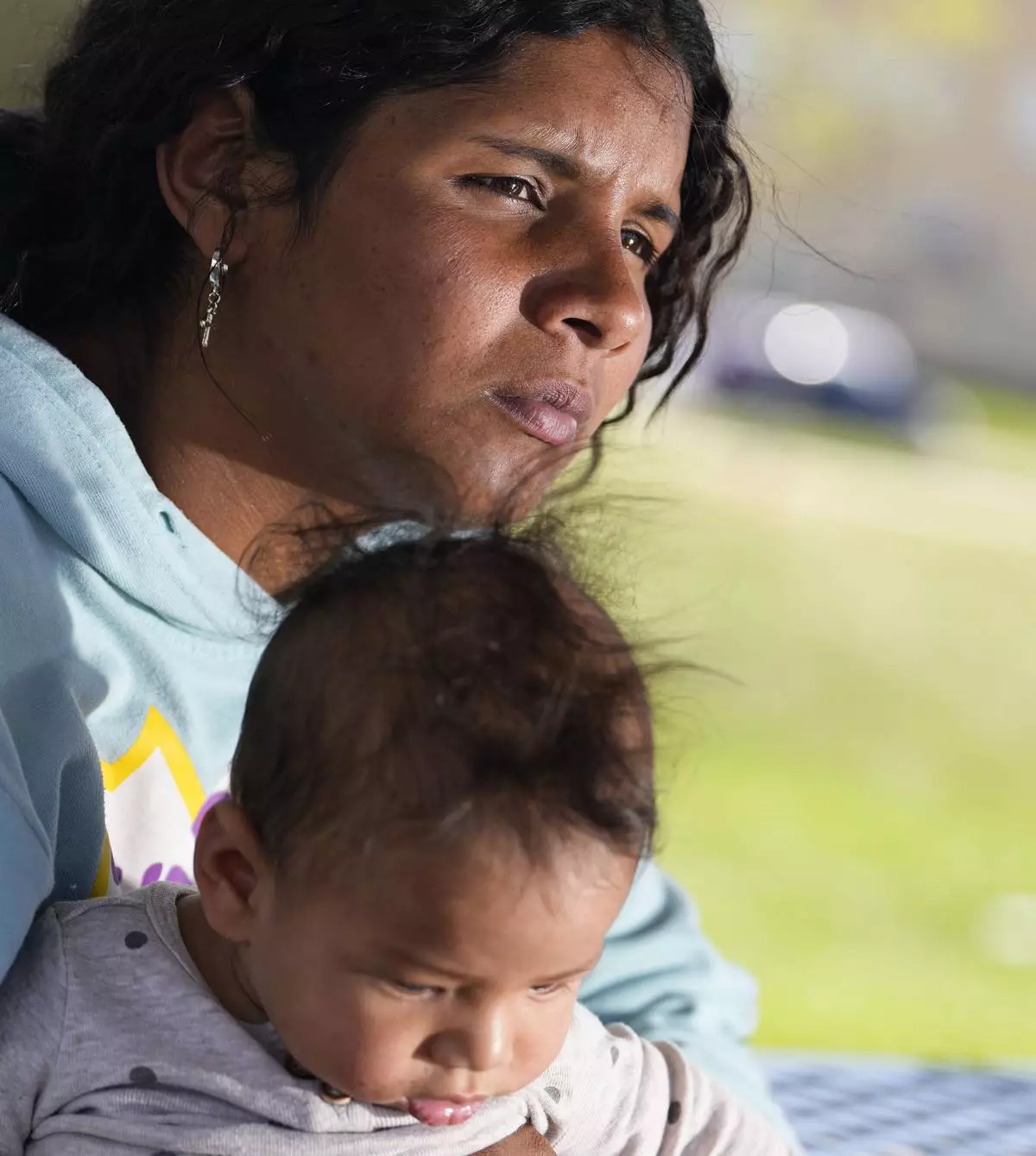
Ivanni Herrera holds her baby Milan Guzman during an interview in a park Friday, May 18, 2024, in Aurora, Colorado. (AP Photo/Jack Dempsey)
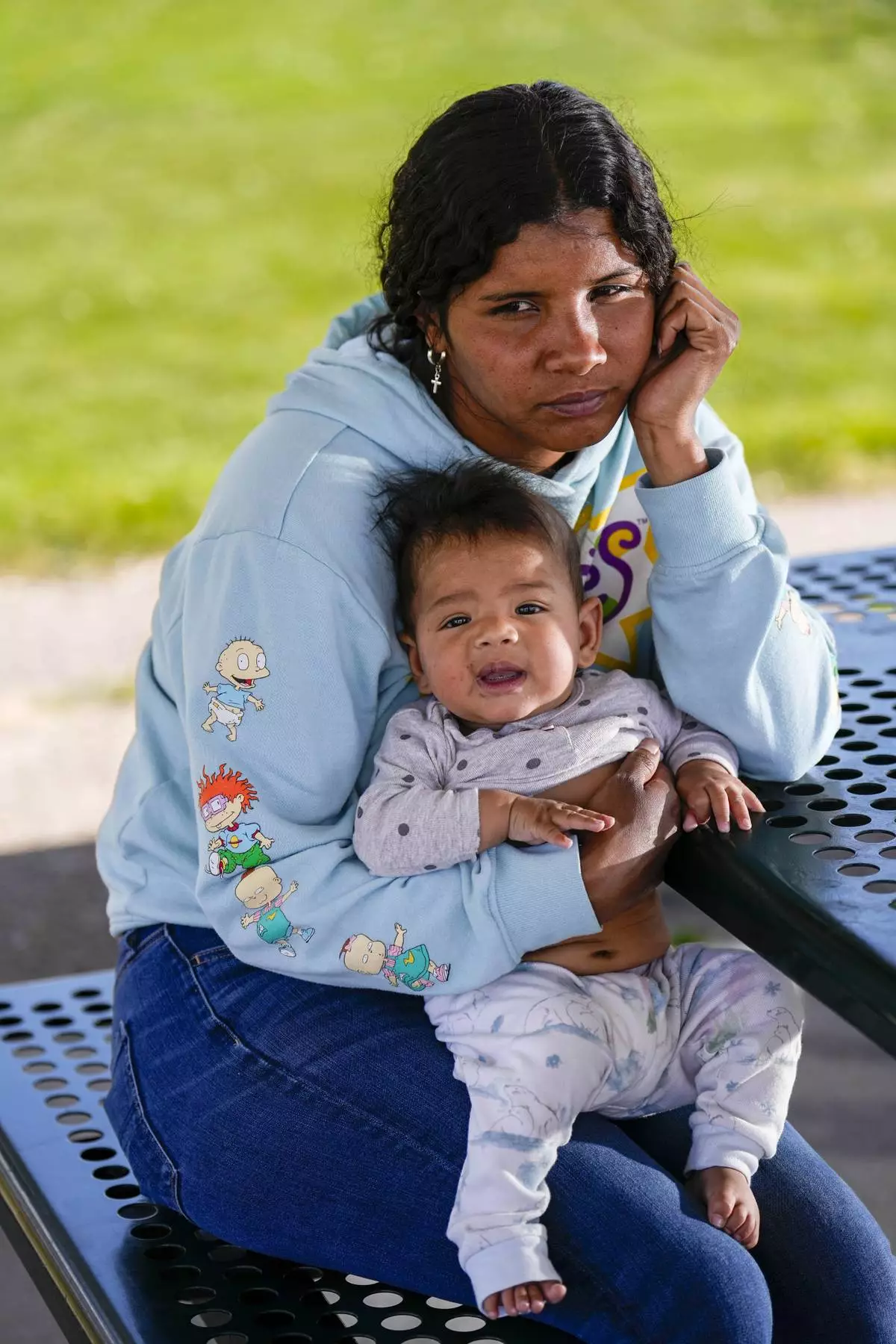
Ivanni Herrera holds her baby Milan Guzman during an interview in a park Friday, May 18, 2024, in Aurora, Colo. (AP Photo/Jack Dempsey)
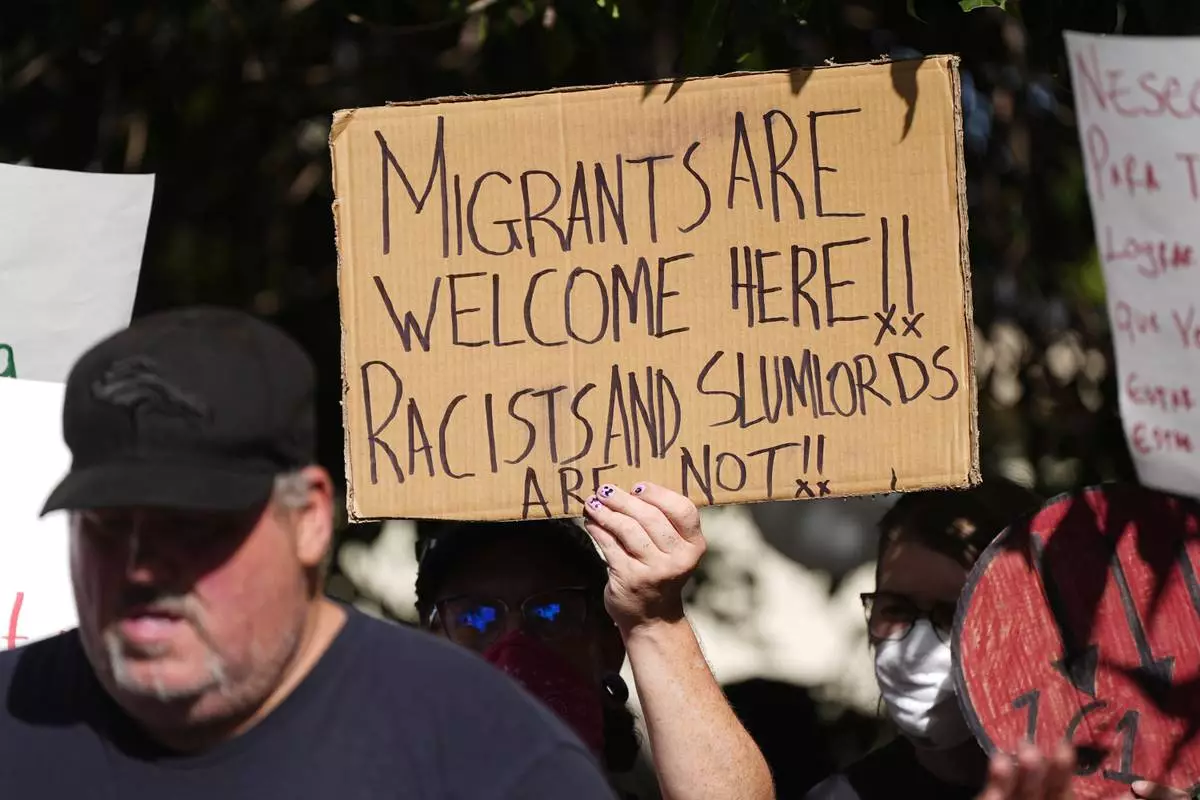
A protester holds up a placard during a rally staged by the East Colfax Community Collective to address chronic problems in the apartment buildings occupied by people displaced from their home countries in central and South America Tuesday, Sept. 3, 2024, in Aurora, Colo. (AP Photo/David Zalubowski)
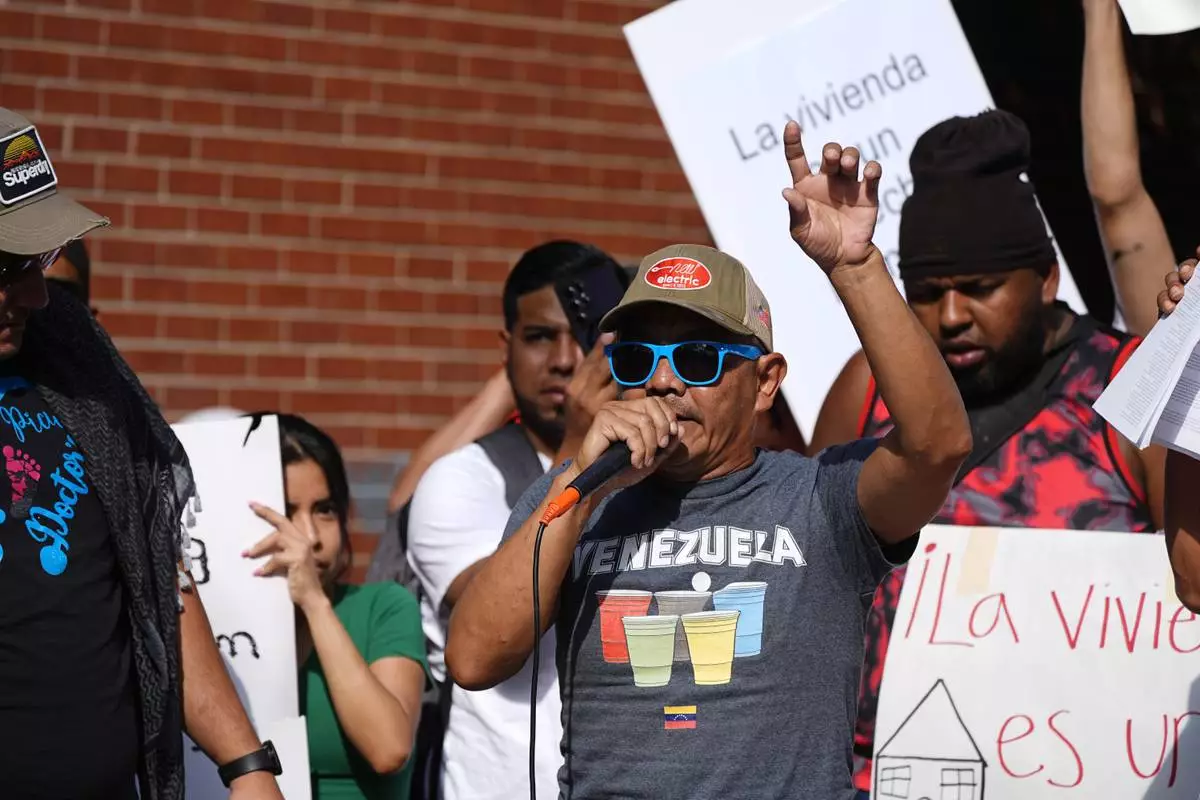
Resident Moises Didenot speaks during a rally staged by the East Colfax Community Collective to address chronic problems in the apartment buildings occupied by people displaced from their home countries in central and South America Tuesday, Sept. 3, 2024, in Aurora, Colo. (AP Photo/David Zalubowski)
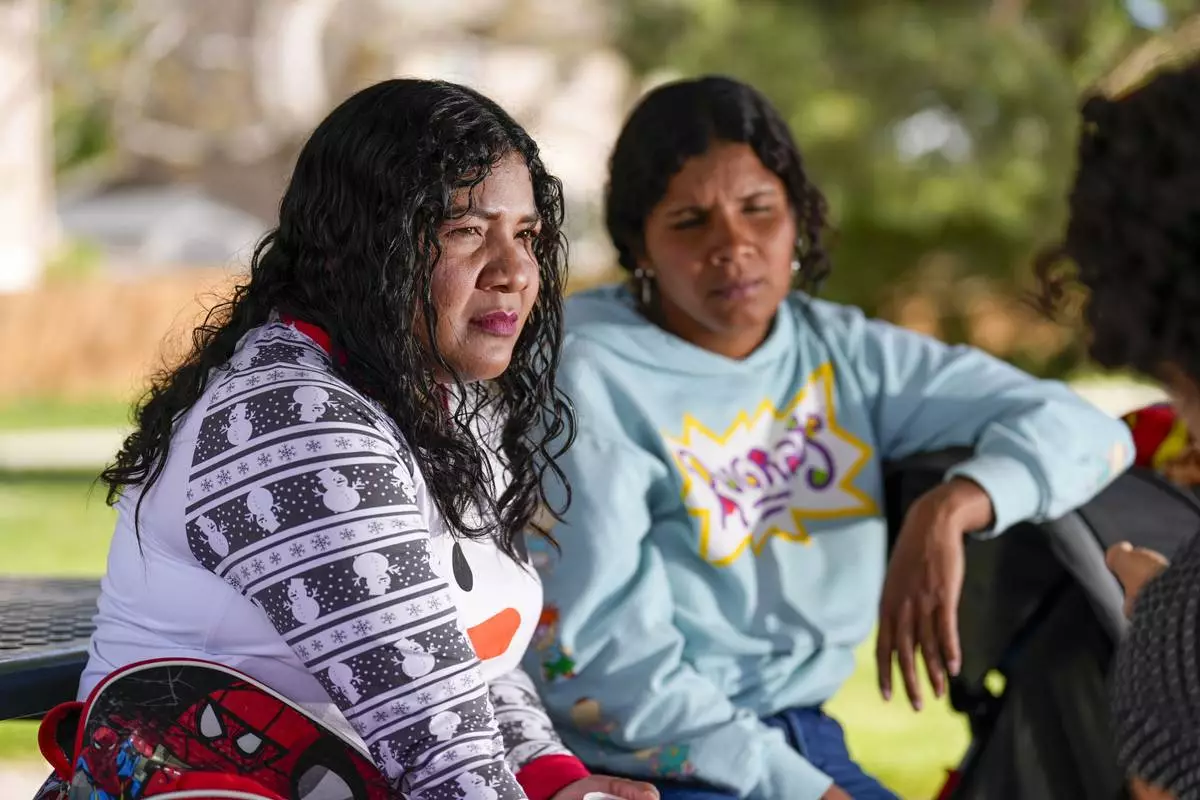
Emily Rodriguez, left, and Ivanni Herrera look on during an interview in a park Friday, May 18, 2024, in Aurora, Colo. (AP Photo/Jack Dempsey)

Manuel Rodriquez, left, and Dylan Guzman play in a park Friday, May 18, 2024, in Aurora, Colo. (AP Photo/Jack Dempsey)
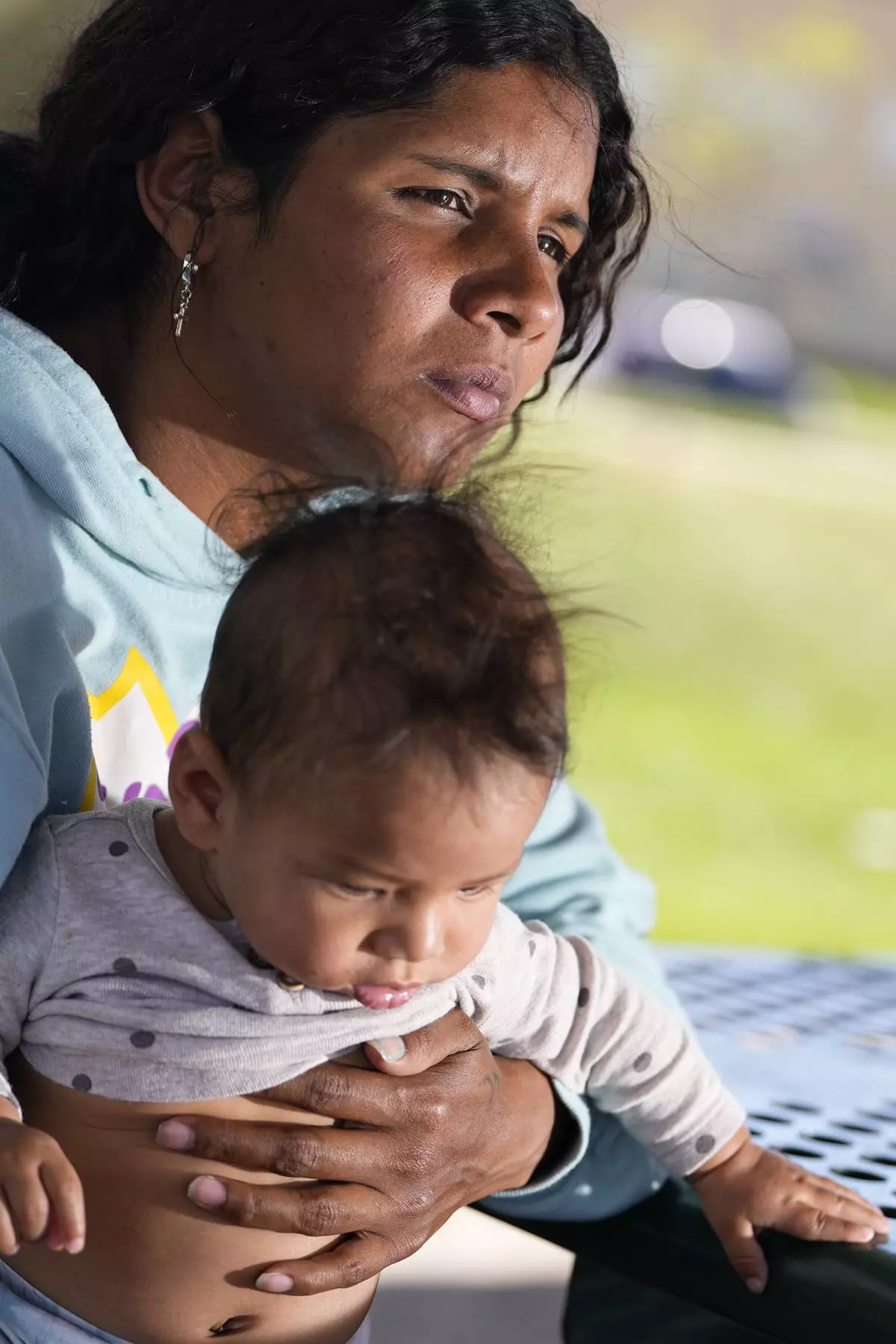
Ivanni Herrera holds her baby Milan Guzman during an interview in a park Friday, May 18, 2024, in Aurora, Colo. (AP Photo/Jack Dempsey)
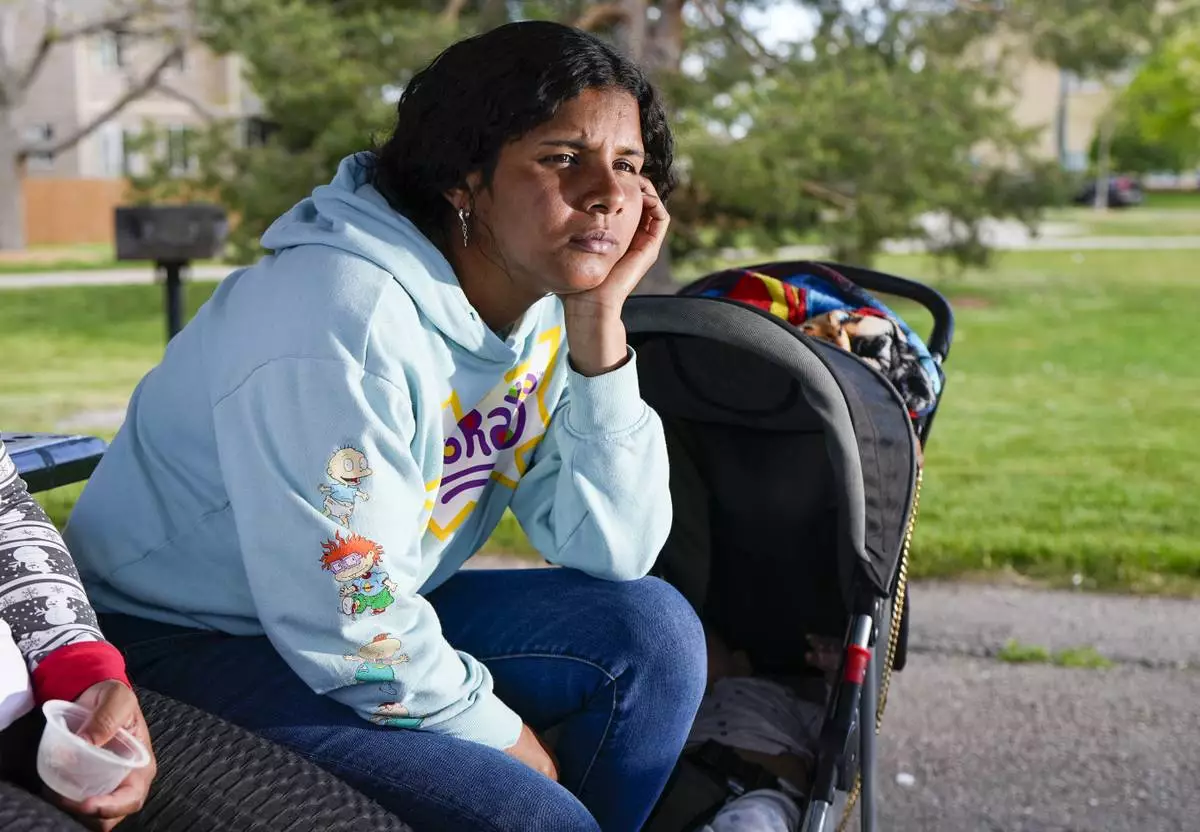
Ivanni Herrera looks on during an interview in a park Friday, May 18, 2024, in Aurora, Colo. (AP Photo/Jack Dempsey)


